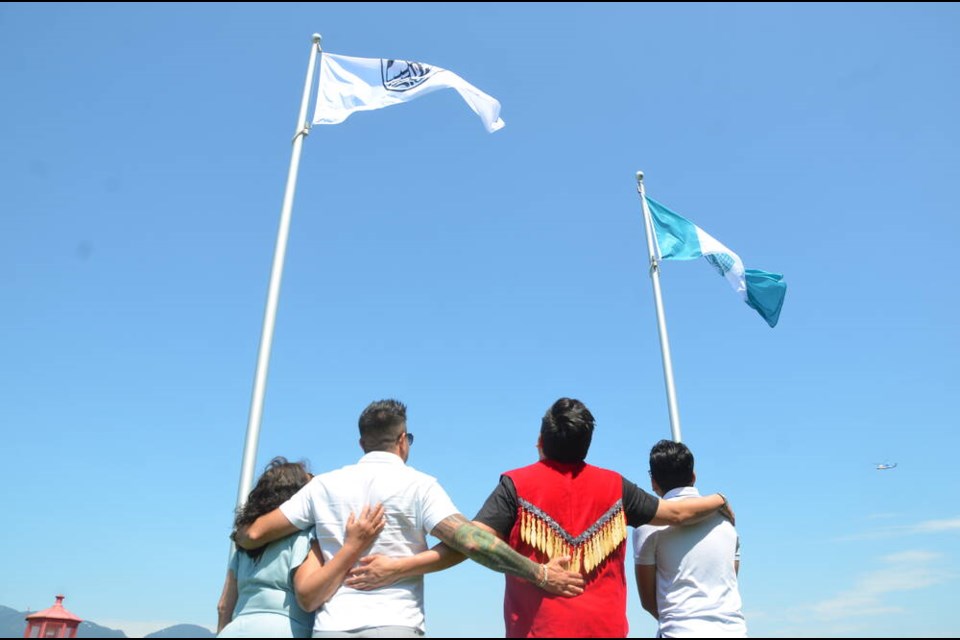If there were to be such a thing as perfect flag-hoisting weather conditions, it would be those spotted on Tuesday afternoon at Stanley Park as flags representing the Tsleil-Waututh, Sḵwx̱wú7mesh Úxwumixw (Squamish Nation) and Musqueam Nations were raised.
The sky, bright blue and cloudless, set a stark backdrop to the three primarily white flags. The wind, nothing more than a light whisper of a breeze, was just enough to have them billowing, their First Nations designs fully displayed to the crowd that had amassed below.
Representatives from the three Nations were joined by members of the Vancouver Park Board and a radiant flock of their friends and family members in welcoming the flags to spapəy̓əq Pápiy̓eḵ, Stanley Park’s Brockton Point. It marked the first time the local First Nations had their flags raised permanently in a Vancouver park.
Over the course of the event many took to the podium, expressing joy and gratitude in being able to experience another step forward in local reconciliation efforts, and to see acknowledgement of their Nations on the land that was, more than anyone’s, their own.
“Today’s raising of the Musqueam, Squamish and Tsleil-Waututh flags at Brockton Point is a significant milestone in establishing a new relationship between Indigenous peoples and the park board, and ensuring the truth is remembered,” said Musqueam Chief Wayne Sparrow.
“Musqueam looks forward to continuing this collaborative work with Squamish, Tsleil-Waututh and the Park Board to recognize our ancestral connections to this land and shared commitment to reconciliation.”
For the thousands of years prior to its use as a public park, Stanley Park had been the traditional territory for Coast Salish First Nations, including the Musqueam, Squamish and Tsleil Waututh. Colonization and the creation of the park resulted in the displacement of hordes of residents, many of whom were evicted in the 1920s and 30s.
“This is not a park. It never was a park. This is our home, our villages, villages that we shared with our relatives and the Squamish and the Tsleil-Waututh,” said Musqueam weaver Debra Sparrow on Tuesday.
“We come here today not just because we want a flag up, but because this is our home, this is who we are and our roots are buried deeply in this very soil that our ancestors are buried,” she said.
The discussion around replacement had begun in 2017 when park board operations staff removed the three original flagpoles, the Canadian, British Columbia and Union Jack flags, that, aged, had been posing a safety risk to park goers.
With homages to Canada, the province and the U.K. already rife throughout Stanley Park – there are currently 15 flag poles commemorating Canada, British Columbia, the Canadian Air Force, Canadian Navy, the City of Vancouver, and the Union Jack – the Stanley Park Intergovernmental Working Group pushed to instead replace them with those of the local Nations, a recommendation that was then approved in 2022.
“This is a true significance of a pathway to reconciliation, to signify the true history of the area,” said Squamish Nation elected council member Sxwíxwtn (Wilson Williams).
Williams said the First Nations are currently working with the park board to implement storyboards and more signage around the park that will detail the Indigenous history of the area.
“We are now in a place where it’s safe to share who we are and where we come from, through ceremonies like today or through just simple conversations,” he said.
To travellers and newcomers who visit Stanley Park, said Tsleil-Waututh councillor Dennis Thomas, the waving flags serve as a welcome greeting, and an immediately noticeable nod to the true history of the area.
“As Coast Salish Nations it is important for us to be good hosts, and when you see a symbol of the three Nations together in a representation of flags, it represents that this is our shared territory,” he said.
“It’s up to us to be stewards of these lands and waters to our visitors and to our guests.”
And for those of the Squamish, Tsleil-Waututh and Musqueam Nations, the park is now a place of honour and comfort, he said, a place where their children and grandchildren can feel at home and learn about their own history and culture.
“I think it’s an act of pride when people are able to see their own Nation’s flag around here,” he said. “It gives them a sense of hope and inspiration. Our people lived here for thousands of years, and had an economy here for thousands of years. Pre-contact it gave them a sense of place. Now they will always be connected and grounded in who they are, and where they come from.”
Mina Kerr-Lazenby is the North Shore News’ Indigenous and civic affairs reporter. This reporting beat is made possible by the Local Journalism Initiative.



